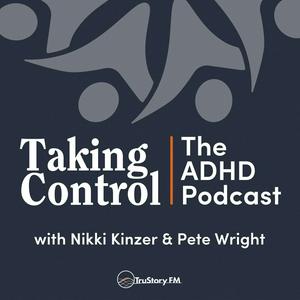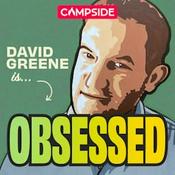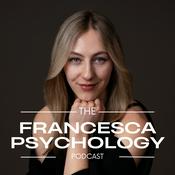531 episodes
- GPS is Now Open! Visit https://takecontroladhd.com/gps to learn more and take control of your planning today!
That “this year will be different” promise feels so good when it’s fresh… and so brutal when the old patterns quietly return. In this episode, Pete and Nikki unpack why that boom-and-bust cycle hits so hard for ADHD brains: the early dopamine of a new system (or a newly organized sock drawer), the unrealistic maintenance expectations baked into most productivity advice, and the emotional crash that follows when the setup doesn’t hold.
They dig into the real trap underneath the resolution mindset—living in the gap between who you were yesterday and who you hope to be tomorrow—and how to pull your attention back to the only place you actually have leverage: today. Along the way, they talk about why asking for help can feel so risky (hello, shame and RSD), how to regulate before you ask, and what it looks like to reframe help as advocacy instead of rescue. The goal isn’t becoming someone new. It’s learning to support the person you already are, with more time, more buffer, and a lot less self-punishment.
Links & Notes
Free download! How to Ask for Help Without the Guilt
(00:00) - Welcome to Taking Control: The ADHD Podcast
(03:30) - Letting Go of the "This Year will be a Different Story" Story 😉
🎯 Ready to turn your planning chaos into clarity? Take a look at Guided Planning Sessions (GPS)—from getting started to mastering your weekly routines. Whether you’re just picking your tools or refining a system that finally sticks, GPS gives you the structure, support, and community you need to make it happen. Explore more and join today at TakeControlADHD.com/GPS.
★ Support this podcast on Patreon ★ - GPS is Now Open! Visit https://takecontroladhd.com/gps to learn more and take control of your planning today!
When you're running on empty, your emotions hit harder and last longer. This week on Taking Control: The ADHD Podcast, Pete and Nikki explore what happens to emotional regulation when you're already depleted—and what you can actually do about it.
Building on last week's conversation about compassionate reframing, this episode dives into the physiology behind emotional dysregulation and RSD (Rejection Sensitive Dysphoria). Pete shares insights from the polyvagal theory and the concept of the "vagal brake," explaining why breathing alone isn't enough when you're in fight-or-flight mode.
Nikki breaks down the differences between emotional regulation, emotional dysregulation, and RSD with real examples that anyone with ADHD will recognize. Then they walk through practical grounding techniques that actually work—from ice cold water to wall push-ups to finding safe connection with others.
You'll learn why your ADHD brain feels emotions at 100% when others are at 50%, why that negative comment from ten years ago still lives rent-free in your head, and how to create safety for your nervous system when you're already overwhelmed.
Plus, get the free downloadable guide: "Regulate and Reframe: A Guide for Emotional Dysregulation and RSD" with simple tools to help you ground, reset, and find your way back to safety.
Links & Notes
Download Regulate and Reframe: A Guide for Emotional Dysregulation and RSD
The Polyvagal Theory by Stephen W. Porges
Polyvagal Perspectives by Stephen W. Porges
Support the Show on Patreon
Dig into the podcast Shownotes Database
(00:00) - Welcome to Taking Control: The ADHD Podcast
(04:04) - Emotional Regulation
(12:34) - Signs Your Tank is Empty
🎯 Ready to turn your planning chaos into clarity? Take a look at Guided Planning Sessions (GPS)—from getting started to mastering your weekly routines. Whether you’re just picking your tools or refining a system that finally sticks, GPS gives you the structure, support, and community you need to make it happen. Explore more and join today at TakeControlADHD.com/GPS.
★ Support this podcast on Patreon ★ - GPS is Now Open! Visit https://takecontroladhd.com/gps to learn more and take control of your planning today!
Pete and Nikki kick off the new season by naming the thing nobody wants to put on a vision board: the post-holiday crash. If you’ve come out the other side feeling “behind,” they argue you’re not failing—you’re recovering. And because ADHD loves a transition about as much as it loves a quiet restaurant, that return-to-normal whiplash can hit harder than you expect.
The temptation, of course, is to fix the feeling by buying a brand-new feeling: new planner, new system, new you, new personality, new carbon-based lifeform. Nikki gently drags that impulse into the daylight and offers a more realistic move—skip the reinvention and reestablish one anchor routine you already know helps. Something small, repeatable, and boring in the way that’s actually useful, whether it’s hydration, an end-of-day reset, or getting sleep back on purpose instead of by accident.
They also lean into compassionate reframing—swapping the “I blew it” narrative for language that’s both true and less cruel—because shame is a famously unreliable productivity tool. There’s a new resource tied to that idea, too, and it’s meant to be the quick handrail you grab when January starts acting like a performance review.
Links & Notes
📃 Download Compassionate Reframing for the ADHD Brain
(00:00) - Welcome to Taking Control: The ADHD Podcast
(03:26) - You're Not Behind... You're Exhausted
🎯 Ready to turn your planning chaos into clarity? Take a look at Guided Planning Sessions (GPS)—from getting started to mastering your weekly routines. Whether you’re just picking your tools or refining a system that finally sticks, GPS gives you the structure, support, and community you need to make it happen. Explore more and join today at TakeControlADHD.com/GPS.
★ Support this podcast on Patreon ★ - GPS is Now Open! Visit https://takecontroladhd.com/gps to learn more and take control of your planning today!
To close out Season 31, we turned the microphones over to someone who knows us better than almost anyone in our community: Melissa Bacheler, our DiscordMom, friend, and occasional chaos agent. Instead of the usual coaching, planning, and problem-solving, Melissa surprises us with a full-blown quiz-show-style conversation designed to reveal stories we’ve never told on air. No points, no pressure—just questions that spark nostalgia, laughter, and a surprising amount of self-reflection.
Melissa steers us through three big categories: personal hobbies, memories from childhood and adolescence, and a handful of wildly imaginative “what if” scenarios. Nikki talks about her deep love of puzzles, watercolor, country music, and solitude. Pete shares his affection for filmmaking, collaborative storytelling, woodworking, and turning every car he’s ever owned into a “Doctor.” Together, they trade stories about childhood fears, nicknames that should never have been uttered in public, their dream cars, early celebrity crushes, and the music that scored each decade of their lives.
And then Melissa goes for the big swings: Who would coach Pete if he could choose any fictional character? How would Nikki run the show if Pete were abducted by aliens—or voluntarily uploaded to the cloud, which frankly sounds inevitable? The answers—if you’ve listened to the show long enough—are deeply on brand.
This is a relaxed end-of-season celebration with the person who keeps our Discord running and our community grounded. Thank you for an incredible Season 31—and yes, Season 32 begins in the new year!
Links & Notes
Support the Show on Patreon
Dig into the podcast Shownotes Database
(00:00) - Welcome to Taking Control: The ADHD Podcast
(02:06) - Support the Show on Patreon!
(03:05) - Quiz Show!
(05:16) - Hobby Lob-by
(18:06) - Nostalgia Nuggets
(39:00) - What If Fantasies
🎯 Ready to turn your planning chaos into clarity? Take a look at Guided Planning Sessions (GPS)—from getting started to mastering your weekly routines. Whether you’re just picking your tools or refining a system that finally sticks, GPS gives you the structure, support, and community you need to make it happen. Explore more and join today at TakeControlADHD.com/GPS.
★ Support this podcast on Patreon ★ - GPS is Now Open! Visit https://takecontroladhd.com/gps to learn more and take control of your planning today!
Emotional planning sounds like one of those concepts you think you already understand — until you realize it has nothing to do with mood journaling, crystal grids, or color-coding your feelings. What Nikki brings forward in this conversation is something far more practical: the idea that ADHD motivation doesn’t start with logic. It starts with emotion. And if we learn to work with that reality instead of trying to muscle our way through it, the whole experience of getting things done changes.
This episode was sparked by a discussion inside GPS, where members were reflecting on our earlier conversation with financial coach Nicole Stanley. Nicole talked about how emotionally meaningful goals are the ones we actually stick with — even when motivation falters. That hit a nerve. If emotional meaning helps us save money, why can’t it help us take out the trash, send the email, or finally make that dreaded insurance phone call?
From there, Nikki pulls the curtain back on the truth most ADHDers already know in their bones: motivation isn’t something you summon by force. You can’t shame yourself into momentum. You can’t logic your way into action. And no amount of telling yourself you “should just do it” will magically conjure wind in your sails.
We talk instead about how to invite motivation in: through novelty, stimulation, environment shifts, sensory comfort, short timers, playful challenges, and co-working with others who get it. We look closely at body doubling — not as a trend, but as an ADHD-power-tool that reliably flips the activation switch for so many of us. We explore how accountability creates connection, how structure eases initiation, and how changing a setting (or a soundtrack… or even a pen) can lighten the emotional load of tasks we avoid.
And finally, we dig into the heart of emotional planning: identifying meaning in the task itself. Not fake meaning, not “I should care about this,” but real alignment — who benefits, what value the task honors, and how it makes life easier for future you. By the time Pete unexpectedly processes his own insurance-related avoidance live on the show, emotional planning has become more than a coaching tool. It’s a reframing — one that reminds us that motivation isn’t a moral quality; it’s a relationship between emotion and action.
If you’ve been stuck, stalled, circling a task like it’s a shark in shallow water, this episode gives you both language and strategy to step toward it with less dread. It’s not about forcing motivation. It’s about building the conditions where motivation has an easier time finding you.
Links & Notes
Support the Show on Patreon
Dig into the podcast Shownotes Database
(00:00) - Welcome to Taking Control: The ADHD Podcast
(01:58) - Support the Show at Patreon.com/theadhdpodcast
(03:43) - Emotional Planning
(14:10) - Invite Meaning In
🎯 Ready to turn your planning chaos into clarity? Take a look at Guided Planning Sessions (GPS)—from getting started to mastering your weekly routines. Whether you’re just picking your tools or refining a system that finally sticks, GPS gives you the structure, support, and community you need to make it happen. Explore more and join today at TakeControlADHD.com/GPS.
★ Support this podcast on Patreon ★
More Education podcasts
Trending Education podcasts
About Taking Control: The ADHD Podcast
Nikki Kinzer and Pete Wright offer support, life management strategies, and time and technology tips, dedicated to anyone looking to take control while living with ADHD.
Podcast websiteListen to Taking Control: The ADHD Podcast, The Jefferson Fisher Podcast and many other podcasts from around the world with the radio.net app

Get the free radio.net app
- Stations and podcasts to bookmark
- Stream via Wi-Fi or Bluetooth
- Supports Carplay & Android Auto
- Many other app features
Get the free radio.net app
- Stations and podcasts to bookmark
- Stream via Wi-Fi or Bluetooth
- Supports Carplay & Android Auto
- Many other app features


Taking Control: The ADHD Podcast
Scan code,
download the app,
start listening.
download the app,
start listening.






































